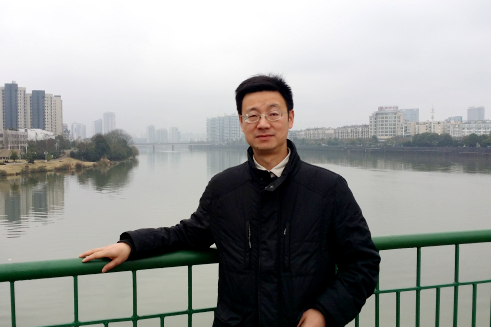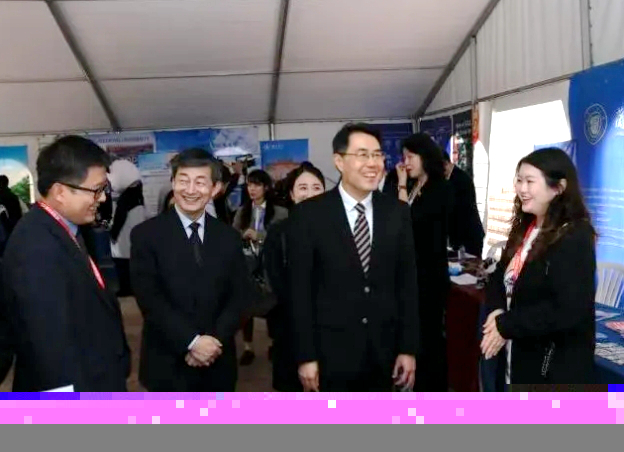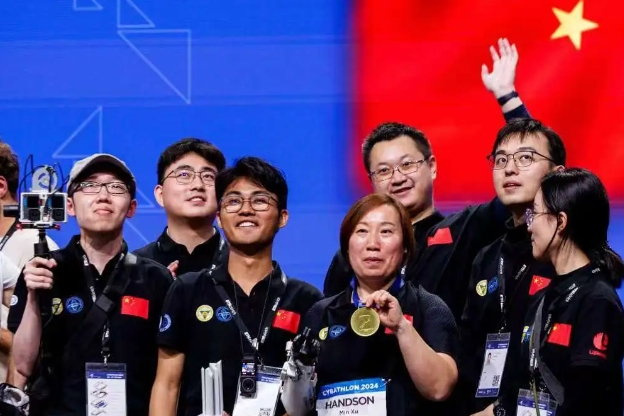
At Southeast University, there is such a professor who got the “863” project at the age of 28 and acquired the “National Natural Science Foundation” in the same year. At the age of 30, he was promoted to associate professor and professor at 32, the doctoral tutor at 33 and served as the dean at 36.
In addition, he is also the winner of “National Outstanding Youth Fund”, “China Youth Science and Technology Award”, the national candidate of “New Century Talents Project”, the “National Excellent Science and Technology Worker”, etc. He has undertaken or accomplished many national teaching reform projects.
In the autumn of 2017, he was granted “Special Award for Outstanding Teacher of Baosteel”. Meanwhile, the project he directed won the first prize of the fifteenth “National Challenge Cup”. At the beginning of 2018, he, as the person in charge, was awarded the second prize of the National Technology Invention for his work --- Force Perception and Feedback Technology of Human-computer Interaction Teleoperation Robot.
He is Professor Song Aiguo, Dean of the School of Instrument Science and Engineering at Southeast University.
Good Teacher Accomplishes Good Student
In November 1968, Song Aiguo was born in an ordinary family at the bank of Xin’an River in Huangshan City, Anhui Province. In the summer of 1980, Song Aiguo was enrolled by the secondary middle school of Luxi No. 1 Middle School, a key middle school in Anhui Province with outstanding results and then met a very good Physics teacher, Teacher Liu Yiqi, who can always explain sophisticated physical phenomena in a simple manner and stimulate the students' interest in learning. In the autumn of 1983, Song Aiguo entered the senior high section, where he met Chen Xinfa, the headteacher teaching Chemistry. Under the guidance of Teacher Chen, Song Aiguo conducted a number of extracurricular chemistry experiments independently in the Chemistry interest group and cultivated scientific interest. Under the guidance of Teacher Chen, he wrote several chemical essays, one of which about the contrast experiment regarding the solubility of sodium hydrogen and sodium carbonate and the analysis of hydrogen-bond interaction also won the second prize of the extracurricular science and technology competition of senior high school students in Anhui Province. In addition, Song Aiguo was also screened into the physics interest group and the math interest group, participated in extracurricular science and technology activities such as model airplane production. It was his great interest in aviation and ambition for the blue sky that Song Aiguo applied for Nanjing University of Aeronautics and Astronautics in 1986, where he spent nearly seven years for undergraduate and graduate studies.
“The Foundation of Research on Robot at Southeast University Was Achieved at the Cost of Life!”
During his undergraduate studies, Song Aiguo not only performed well, but also applied his knowledge to help enterprises solve some technical problems. In 1989, China Academy of Launch Vehicle Technology (CASIC No. 1 Research Institute) established the “Long March” scholarship for the first time at Nanjing University of Aeronautics and Astronautics. Song Aiguo was awarded the first “Long March” scholarship as a model of “knowledge application”.
Upon completion of his graduate studies in February 1993, Song Aiguo studied for Ph. D degree at the Department of Instrument Science and Engineering of Southeast University University. On the first day when Professor Wan Weiyi taught the first lesson of “Robot Sensing Technology” to Song Aiguo and other students, Professor Huang Weiyi told everyone: “the robot research undertaking at our laboratory is developed at the cost of Mr. Cha Liguan’s life! We shall feel sorry to Teacher Zha if we couldn’t well develop the robot technology of Southeast University”. These words are keeping fresh in Song Aiguo’s mind and have been always inspiring him.
Two Decades of Grinding Sword to Win National Award for Technological Invention
In March 1993, Professor Huang Weiyi proposed his dissertation of “863 Project” titled as “Basic Research on Force-Sensing Robots”, the basic research focusing on the significant demands of future space exploration missions in China, that is, to solve the problem of large time delay in space communications, the perception feedback and control of on-the-spot remote operations by robots.
After graduation with Ph.D. degree, Professor Huang Weiyi recommended Song Aiguo to follow the post-doctoral research with Professor Lu Jiren at the Department of Radio Engineering. In 1996 when China’s “863” high-tech space program was officially implemented, the tele-science and telerobotics was deemed as one of the important themes. The “863” Expert Committee in Aerospace found that the Robot Sensing and Control Technology Laboratory of Southeast University had developed the studies on the on-the-spot remote operations by space robots early domestically. Thus the first batch of “863” Application Guideline of Space Robots in Aerospace project was granted to the Department of Instrument Science and Engineering of Southeast University. In this way, the 28-year-old Song Aiguo successfully obtained his first “863” space project.
Based on researches of three years, the problem of control instability caused by space robot’s communication latency of about 3 seconds was finally solved; besides, the ground simulation space robot teleoperation demonstration system was established, which had verified the effectiveness of the control technology and the force feedback technology. In 1998, Song Aiguo was awarded the second “863” project. This time he extended the solution to the 3-second latency to the 10-second latency. In 2002, he proposed the research idea of heterogeneous robot feedback hand controller, which was once again funded by “863” project. After 2005, the project team has received support from nine “863” projects. In 2016, Song Aiguo took the lead in declaring the first national key research and development project, which was sponsored by national support of RMB 46.43 million.
On the basis of basic technical researches for more than 20 years, the project team has developed high-precision robot six-dimensional force sensor, bionic flexible tactile sensor, miniaturized force feedback actuator, high-precision large space six-degree-of-freedom force feedback hand controller, force touch perception data gloves, core components or devices of other human-computer interaction telerobots and four types of teleoperation mobile robot systems, etc., which have been widely applied to important fields such as manned spaceflight, lunar exploration engineering and nuclear power engineering in China. This award-winning technology has also manifested its major functions in “Tiangong No. 2” and “Lunar Rover” projects.




